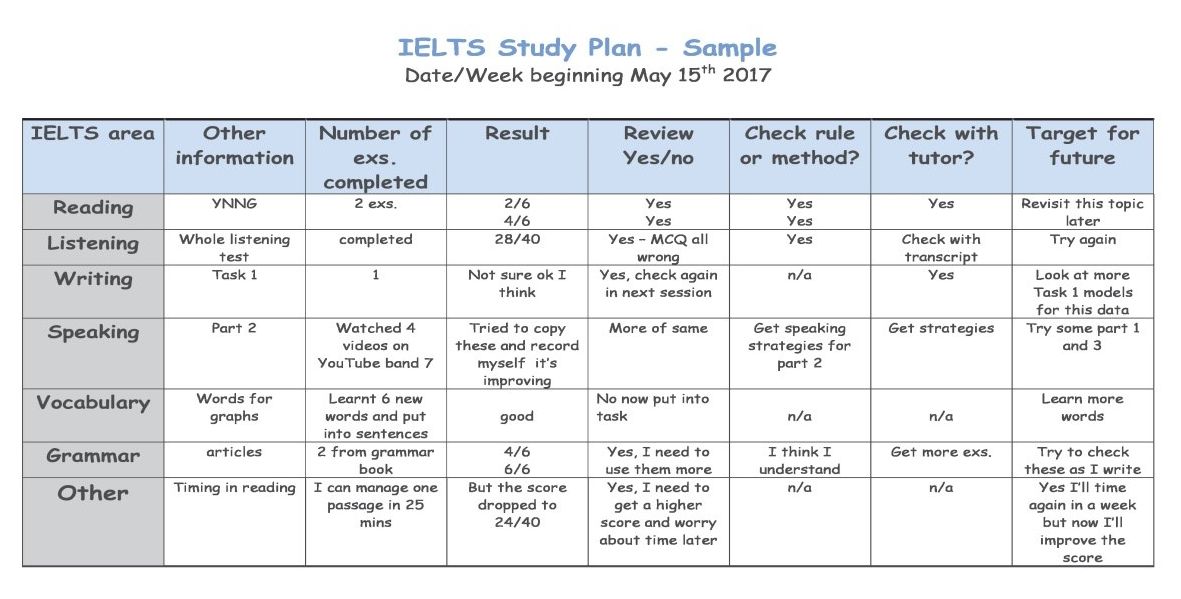A good effective routine is something that you really have to do for yourself. Everybody’s life and timetable has a different rhythm and your study plan will need to coincide with this. Having said that however, there are good principles around setting a study timetable that you can use to make sure you are maximising the time you have and also addressing everything that you need to address.
Firstly as all skills in English language work with each other, it makes sense to practise all of them all the time. To explain; what you hear (IELTS Listening) will help you with what you say (IELTS Speaking) and what you read (IELTS Reading) will help you with what you write (IELTS Writing), nothing is isolated. Furthermore the topics that appear in listening and reading can also appear in writing and speaking in different forms so everything cross fertilises and therefore the very best study plan will allow this to happen. This means two things; keep an open mind and make sure you try and address every part of the test regularly.
In order to formulate an effective study routine you need to address three things; firstly your availability, secondly how long you want to study for and finally what you want to achieve.
Your availability
Be realistic. Don’t spend all night studying - little and often is far better for learning skills-based subjects like language than an all-night session once a week. The progress you make with language is incremental so a step by step approach makes more sense. If you are able to manage an hour or 90 minutes each day that would be ideal. If this isn’t possible then on the days when you cannot devote an hour try to listen to something on your way to work or in your break. If you only have 20 minutes then do one reading passage or task 1 writing.
When you have decided on your daily commitment then create a timetable. Using an online calendar like Google or Outlook will alert you so that you don’t forget.
Now look at where you need to focus the most and the length of time you are setting yourself before the exam.
Your Exam Date
If you have already booked this then you have no flexibility so look at your availability against the exam date and work out how much you need to complete before that date.
If you haven’t set a date then think about where you are now. If you have never taken the exam then check your score by trying an IELTS test and looking at what your score is – that will give you an idea of how much you need to study before you will be ready.
If you have taken the test before then you will know your scores and again you can work out how much time you will need to prepare before you book another test. You can also look at my article (from November 8th) about how much can be achieved in 1 month. In my experience most students underestimate how long they will need to be absolutely ready for the score they want so estimate what you believe you need and then add another 2 or 3 weeks.
If your main challenge is reading – then depending on how far away you are this can usually be rectified quite quickly with strong techniques and practice.
Listening and speaking will require regular and sustained practice.
Writing will generally take the longest even if you are only half a band away.
The advice is don’t waste money on an exam if you are not absolutely certain you can get your scores. Spend more time and maybe some money on getting the help and support that you need to make sure you will get your band in your next test.
Where you need to focus
This information will help you to organise an effective timetable that will move you to the band you want in your next exam.
Think about the last score you got (or the scores in your practice tests if you haven’t yet taken the exam). Then drill down further and see where exactly in that part of the test you lose marks. This is where you need to focus the most. If you’re having problems with part 3 listening then do more of this. If you always make mistakes with YNNG then do more of these. If you have problems with articles in writing then sort this out before you start to write any more complete tasks.
You’ve probably heard me say this many times but a marathon runner does not run marathons every day. They work on small, incremental, steps that will improve their overall performance in the marathon and so must you. Doing complete tests every day is like doing daily marathons and hoping your time will improve. It’s not the test but the individual components that are stopping you which are important.
Try to set yourself a weekly timetable and also keep a learning diary – this can be just a notebook. After each session write down what you did well, what you need to practise more and any other things that you need to check or consider.
Here is an example of my Learning Plan for IELTS (you can find it in free resources on the website)
You can do it online or using pen and paper whichever you prefer. Be systematic and stick to your plan as far as possible. You should review it weekly and also monthly and change anything that isn’t working or that needs adjusting so that it remains fluid and compatible with your study rhythm.
By being more systematic and organised in your study you will find that the right things improve and you will move towards your target much more easily than if you work in a more haphazard and less organised way.

